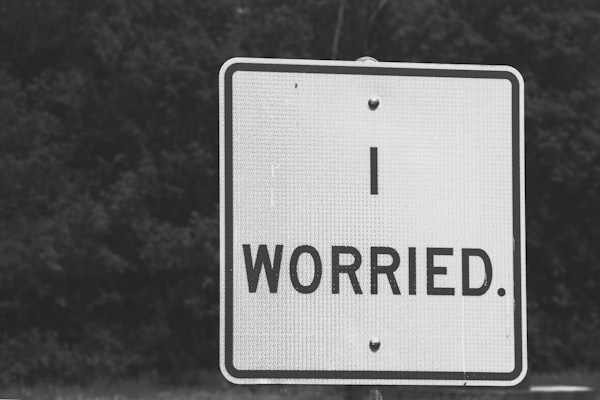Breakthrough: How I Was Diagnosed With ADHD
My experience of receiving an ADHD diagnosis at 33 years old.

This post is part two of a two-part series. Read the first part — How I Was Diagnosed With OCD — here. I decided to write these posts because I receive a lot of questions about how I received my diagnoses. Since I was diagnosed with both OCD and ADHD in my 30s, there is a lot of background so these posts are LONG. In sharing my whole story, however, I hope to make even one reader feel less alone and to encourage them to get the help they need and deserve. I wish I had received these diagnoses and gotten help sooner.
Annnnnd breakthrough part THREE: my Autism Diagnosis.
The Breakthrough
When I first received my OCD diagnosis in 2018, I thought, Ah, I get it now. This is what it feels like to have a breakthrough in therapy. Little did I know that I would experience that feeling tenfold when I received my ADHD (Attention-Deficit/Hyperactivity Disorder) diagnosis in March 2020, five days before my 33rd birthday.
The possibility that I had ADHD had come up in therapy only once before — right after I was diagnosed with OCD. I had arrived at my appointment a few minutes late and expressed frustration with my inability to leave my house on time, even when I had no real reason to be running late. I mentioned that I’d read an article about adult ADHD and was wondering if I had it. My therapist completely dismissed my concern though. Maybe it was because she knew that my OCD frequently manifested as health anxiety and I was prone to feeling like I could acquire illnesses just by reading about them, but the topic of ADHD never came up with her again.
On March 3, 2020, two and a half years after I first mentioned ADHD, I walked into my psychiatrist's appointment expecting to receive a prescription for medication that would help treat my OCD. I had been dealing with overwhelming anxiety and depression and my (new) therapist said something like, “why live this way if you can do something to make yourself feel better?” It was the first time in my life that I’d seen a psychiatrist. Prior to that, all of my medication had been prescribed by primary care doctors (more on that in an upcoming post about my experience with antidepressants).
During my first appointment, I mentioned that my brain had a habit of jumping all over the place, that I found it extremely hard and daunting to get started on tasks, even small ones or ones I wanted to do, and that I had trouble processing what people were saying even when I was staring directly at them as they talked. I’d often tune out and then back in in the middle of the conversation and then feel too embarrassed to ask what I’d missed. After talking about that and a ton of other observations, like my inability to remember things I told myself to do seconds before, my tendency to get hyperfocused on things I cared about, and my lack of time management and organizational skills, my psychiatrist mentioned that I might have ADHD.
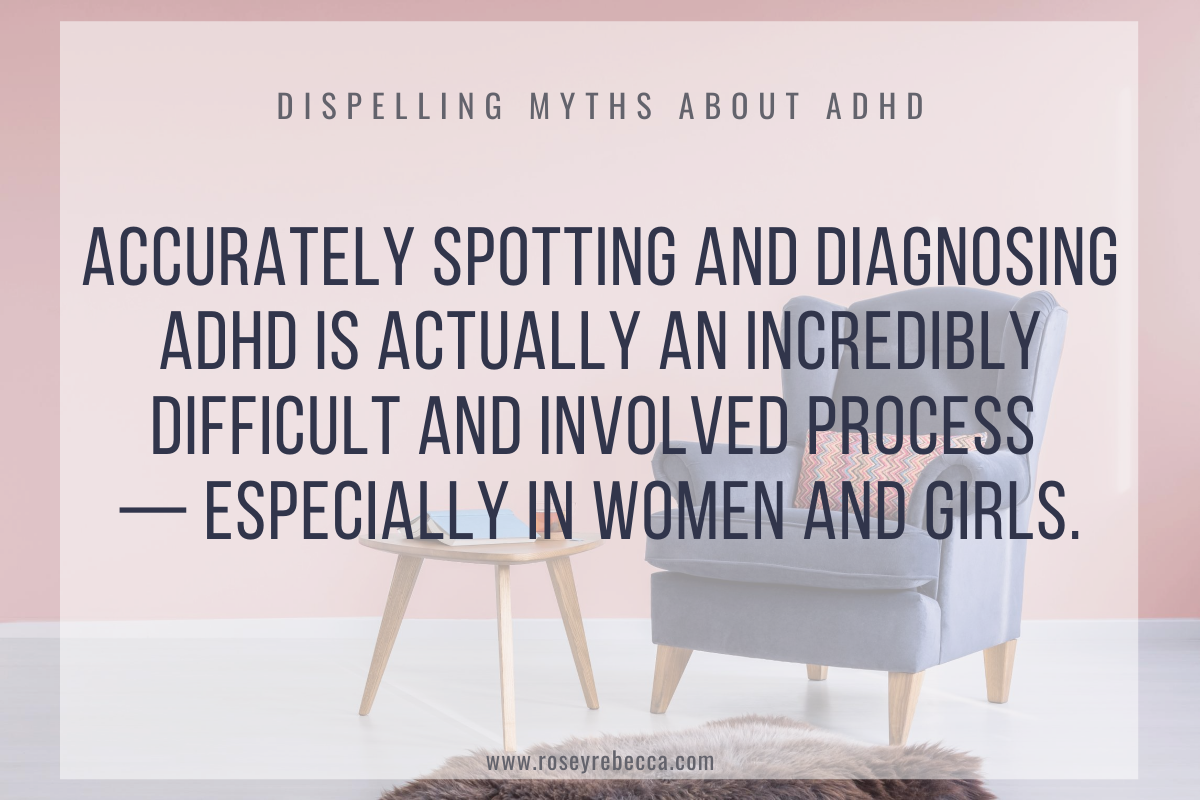
Dispelling Myths About ADHD
Before I had reason to research ADHD, I had a pretty surface-level understanding of what it actually was. Admittedly, I’d heard and believed the myths that only little boys got it or that it was something kids were diagnosed with when they were acting like, well, kids and their parents and teachers didn’t want to deal with them. So it surprised me to learn that accurately spotting and diagnosing ADHD is actually an incredibly difficult and involved process — especially in women and girls. It’s also not something that goes away once you get older, rather if you are diagnosed as an adult, it means you had ADHD as a child.
Part of the reason ADHD is so hard to spot is that the symptoms differ from person to person and include much more than difficulty paying attention and having too much energy. Another common misconception is that ADD and ADHD are different — they’re not. ADD is an old term that was used before the DSM (Diagnostic and Statistical Manual of Mental Disorders) clarified that hyperactivity — the ‘H’ in ADHD — is one of many symptoms that can but doesn’t always present in children and adults with ADHD. Just as people with OCD or Depression might not present with all of the classical symptoms, people do not need to present with every symptom to be diagnosed with ADHD.
Another reason ADHD is hard to diagnosis — especially in adults — is that the symptoms change and grow as you do and often overlap with symptoms of other conditions — like OCD. Many of the behaviors that I described in my OCD diagnosis post are also symptoms of ADHD, which makes it pretty difficult to distinguish between the two and explains why I missed it for so long. I see now that I dismissed my ADHD as symptoms of anxiety and depression, which are conditions that can certainly coexist with ADHD but in my case, I feel were fueled by it instead.
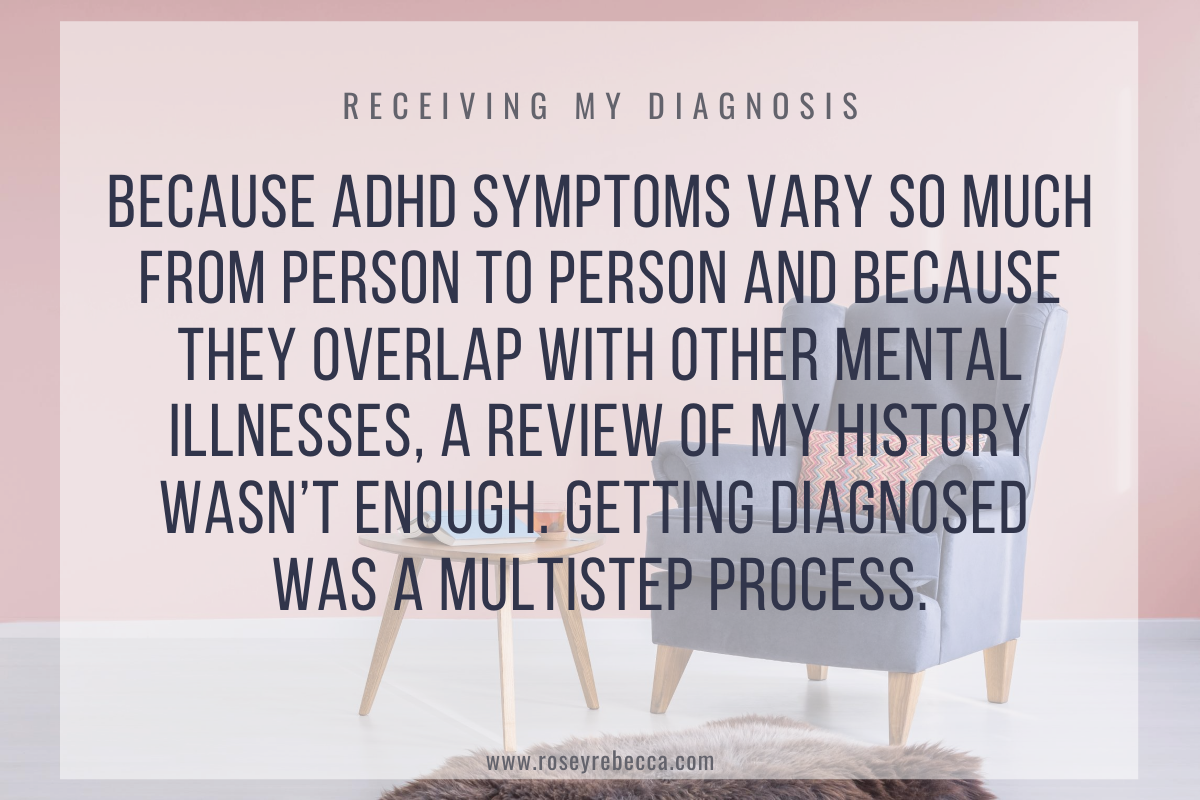
Receiving My Diagnosis
As I mentioned above, the process of receiving an ADHD diagnosis involves much more than a one-time appointment with a psychiatrist or psychologist. My OCD diagnosis didn’t require any extensive assessments or testing — just a thorough recount of my history of OCD symptoms. Because ADHD symptoms vary so much from person to person and because they overlap with other mental illnesses, however, a review of my history wasn’t enough. Getting diagnosed was a multistep process that involved answering a ton of questions, having my close friends and family answer a ton of questions about me, and taking a QbTest - a diagnostic tool used to measure activity, attention, and impulsivity.
First, I was given an ADD Brain Type Indicator self-assessment with instructions to have someone close to me fill it out about me as well. The assessment was a list of behaviors that I had to rate on a scale of 0 to 4, 0 being things I never do and 4 being things I very frequently do. As I went down the list of behaviors, I found myself thinking, wait, this is a symptom of ADHD? I definitely do this. Of the 58 behaviors listed in the assessment, I rated myself a 4 for more than half. Later, when Jeff took it for me, he rated me a 4 for even more of them.
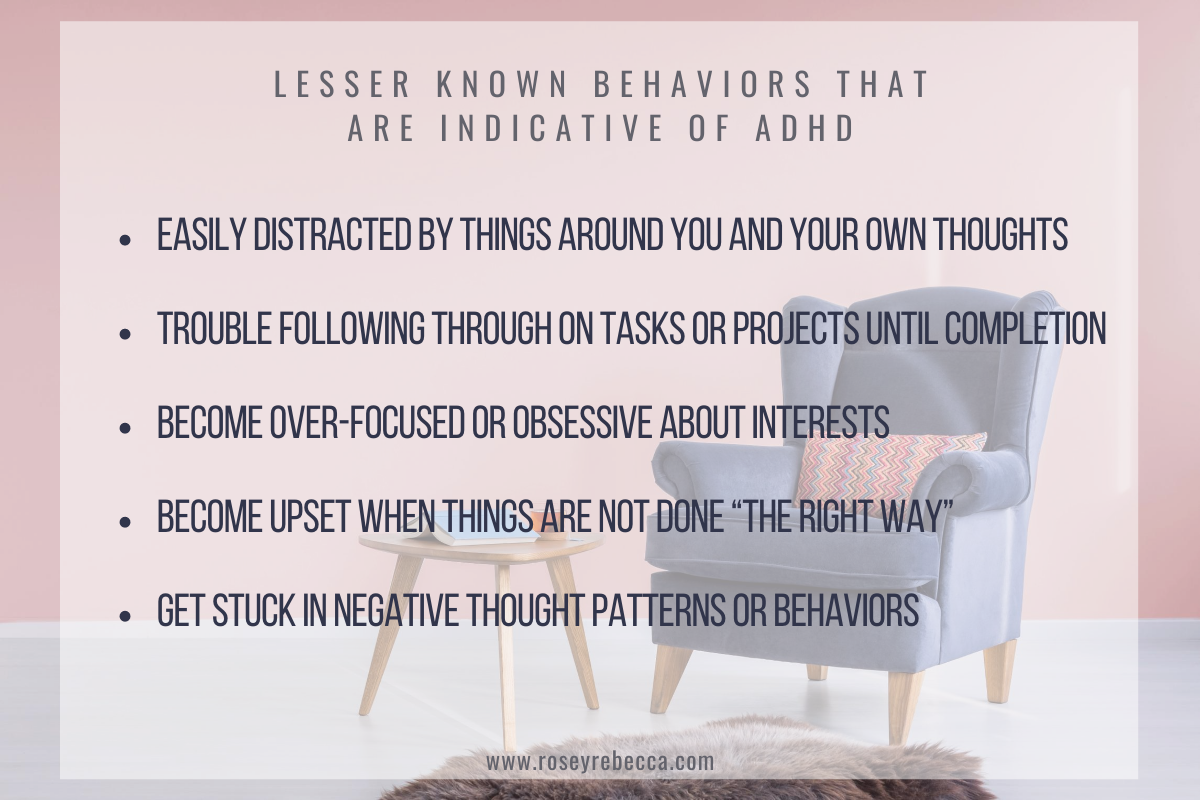
After I completed my assessment, I took the QbTest. If I didn’t think I had ADHD before taking this test, I knew for certain about halfway through. It was one of the most uncomfortable tests I’d ever taken. It took around 20 minutes but felt like 20 years.
I sat in a chair across from a computer monitor with a motion sensor attached to my head. I was instructed to hold a clicker in my hand and to hit the response button whenever I saw a certain colored shape appear on the screen. I had to ask for the instructions to be repeated three times. When the test started it seemed easy at first but soon I was just impulsively hitting the button or hitting it two to three seconds after the shape I was looking for appeared on the screen. About 3 to 4 minutes in, I realized I was rocking back and forth. About 10 minutes in, I suddenly felt very angry, impatient, and had a strong desire to get up and leave the room. About 12 minutes in, I found myself staring at the wall instead of the computer screen. A shape would appear on the screen and I would immediately forget its color. Or I would think I was hitting the button but wasn’t sure so I’d hit it again. Finally, the test ended and I left as fast as I could. It upset my brain for the rest of the day.
After an ADHD specialist reviewed my results, my psychiatrist told me that yes, it did appear that I had ADHD. My results showed that I have significant impairment with impulsivity and moderate impairment with hyperactivity and inattention. Since there are different types of ADHD, she asked me to take the Amen Clinics ADD Type Test* and report back. I had some friends and family take it for me as well and we all got the same results.
I need to pause here to say that I stopped seeing this particular psychiatrist shortly after I got my results. I intend to write a blog post about my history with therapy and how I finally found the right support team. So all I’ll say for now is while I’m very grateful that this psychiatrist spotted my ADHD and got me started on the right medication for my OCD, I decided to stop seeing her after she said some questionable things like calling the Coronavirus the 5G virus and questioning whether I wanted to go with a holistic approach to treating my OCD instead of taking meds, to which I replied, um, no, that’s why I’m seeing a psychiatrist. More on that another time.
Additionally, during my Autism evaluation in September 2021, I was reassessed and diagnosed with ADHD - combined presentation and rely on the research around that particular description more than any of the descriptions in the the Amen Clinic model.
Dealing With My Diagnosis
Since I was only recently diagnosed with ADHD and had to switch psychiatrists shortly after my diagnosis, I am still very much in the ‘learning and processing’ phase. What I’m learning is that so many of the things that I beat myself up over my entire life weren’t actually my fault. I used to agonize about why I couldn’t focus on projects, maintain a job or a clean house, and manage my time as effortlessly as my friends and family could. I got mad at myself for waking up early so I’d have enough time to get ready only to rush out the door and be 10 minutes late. I wondered why I couldn’t motivate myself to start things I wanted to do, like writing blog posts, or why in social situations I had such a hard time focusing on the conversation and called myself a bad friend because I often missed or forgot important details. I often labeled myself lazy, stupid, and incapable. So when I say that receiving my ADHD diagnosis was a breakthrough, even more so than my OCD diagnosis was, I don’t think I can even fully express how relieved I felt and still feel and how much of my life makes sense now.
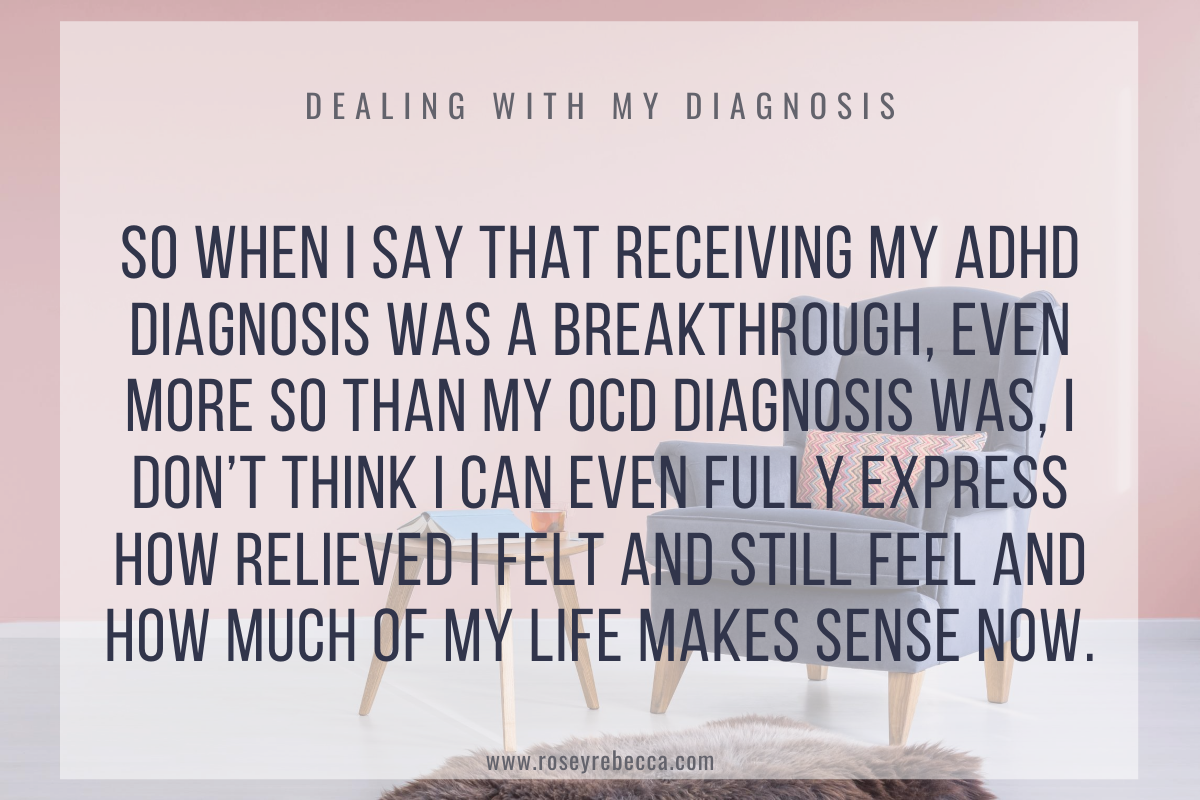
As I learn and process what my ADHD diagnosis means for the way I navigate through my life moving forward, I will write about it here. I plan to write about the ADHD and OCD symptoms that are specific to ME and the observations I make in therapy about the way my brain works. If you take some time to look back on posts I’ve written about anxiety and depression over the last 10 years, you’ll see that I’ve updated them with notes highlighting the symptoms of my ADHD and OCD that went unchecked. Probably the biggest examples of not realizing I had ADHD are in my posts about stopping and starting this blog so many times. Specifically: The Act of Yo-Yoing AKA why I couldn’t stick to anything long-term and how miserable it was making me.
When I was first diagnosed in March, there wasn’t much we could do in the way of medication because the thing about ADHD meds is that they tend to make OCD worse and both psychiatrists (my old one and my new one) stressed the importance of getting my OCD under control before starting them. In June 2020, after having success with my antidepressant, my new psychiatrist (who is amazing, by the way) prescribed ADHD medication. I started at the lowest dose, bumped up to a higher dose a few weeks later, and will be bumping it up again in about a week. While I know that medication won’t fix everything, I feel like I’ve identified the problems and am finding ways to work around them. It took 33 years, but I finally feel like I have some control over my life and my brain.
As always, thank you for reading!
♥︎♥︎♥︎

